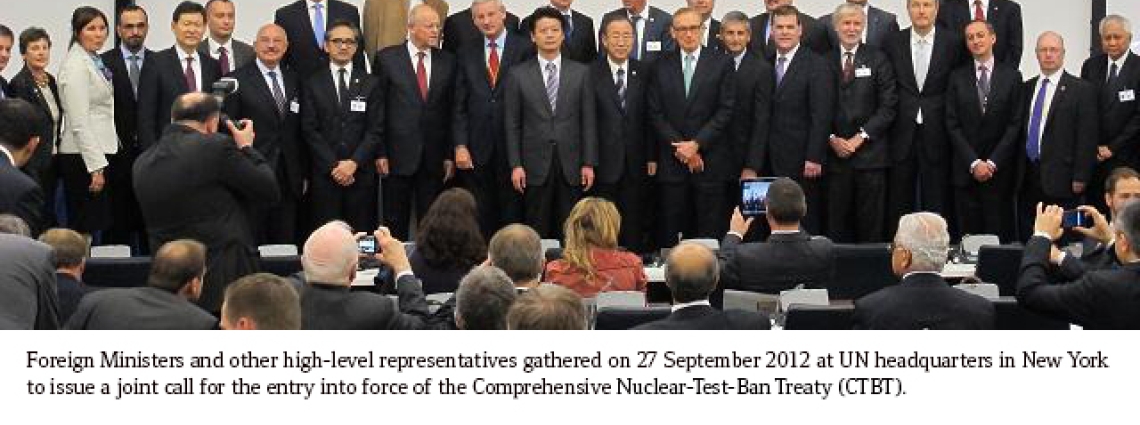Foreign Ministers gather in New York to press for ban on nuclear tests, issue joint call
Vienna, 27 September 2012
Foreign ministers and other high-level representatives met today at the United Nations headquarters in New York to issue a joint call for the entry into force of the Comprehensive Nuclear-Test-Ban Treaty (CTBT).
In their joint statement the foreign ministers described the CTBT’s entry into force as “a vital step towards the reduction and eventual elimination of nuclear weapons by constraining the development and qualitative improvement of nuclear weapons…We call upon all States that have not done so to sign and ratify the Treaty, in particular the remaining eight Annex 2 States [these are China, the Democratic People’s Republic of Korea, Egypt, India, Iran, Israel, Pakistan and the United States].”
United Nations Secretary-General Ban Ki-moon echoed this appeal, telling the States that have yet to sign or ratify the CTBT: “You are failing to live up to your responsibility as a member of the international community.” (Statement)
CTBTO Executive Secretary Tibor Tóth provided the historical context to the meeting against the background of the 50th anniversary of the Cuban Missile Crisis. He called for political leadership to overcome the nuclear danger, stressing that the CTBT is a milestone on the way to a nuclear-weapon free world.
Pulitzer Prize-winner Richard Rhodes, author of the Reykjavik play, reminded delegates that the risk of nuclear extinction is man-made. Thus a man-made solution could be found, as the 1986 Reykjavik summit had demonstrated. In Reykjavik, Reagan and Gorbachev had come close to an agreement to abolish their nuclear arsenals: “A nuclear-weapon free world is not a utopian dream”, Rhodes said. He also invited all delegates to the performance of the Reykjavik play later today, 27 September, at the Baruch Performing Arts Center in New York. See press release for background on the event.
The meeting was co-hosted by the foreign ministers of Australia, Canada, Finland, Japan, Mexico, the Netherlands and Sweden.
Background
The CTBT bans all nuclear explosions by everyone, everywhere: on the Earth’s surface, in the atmosphere, in outer space, underwater and underground. 183 countries have signed the Treaty. Of these, 157 have also ratified the Treaty. At today’s meeting, Iraq and Thailand announced that their national ratification process is well underway.
An unprecedented global verification regime with over 330 facilities monitors the globe around the clock for nuclear explosions to detect any violations of the Treaty.
In their joint statement the foreign ministers described the CTBT’s entry into force as “a vital step towards the reduction and eventual elimination of nuclear weapons by constraining the development and qualitative improvement of nuclear weapons…We call upon all States that have not done so to sign and ratify the Treaty, in particular the remaining eight Annex 2 States [these are China, the Democratic People’s Republic of Korea, Egypt, India, Iran, Israel, Pakistan and the United States].”
United Nations Secretary-General Ban Ki-moon echoed this appeal, telling the States that have yet to sign or ratify the CTBT: “You are failing to live up to your responsibility as a member of the international community.” (Statement)
CTBTO Executive Secretary Tibor Tóth provided the historical context to the meeting against the background of the 50th anniversary of the Cuban Missile Crisis. He called for political leadership to overcome the nuclear danger, stressing that the CTBT is a milestone on the way to a nuclear-weapon free world.
Pulitzer Prize-winner Richard Rhodes, author of the Reykjavik play, reminded delegates that the risk of nuclear extinction is man-made. Thus a man-made solution could be found, as the 1986 Reykjavik summit had demonstrated. In Reykjavik, Reagan and Gorbachev had come close to an agreement to abolish their nuclear arsenals: “A nuclear-weapon free world is not a utopian dream”, Rhodes said. He also invited all delegates to the performance of the Reykjavik play later today, 27 September, at the Baruch Performing Arts Center in New York. See press release for background on the event.
The meeting was co-hosted by the foreign ministers of Australia, Canada, Finland, Japan, Mexico, the Netherlands and Sweden.
Background
The CTBT bans all nuclear explosions by everyone, everywhere: on the Earth’s surface, in the atmosphere, in outer space, underwater and underground. 183 countries have signed the Treaty. Of these, 157 have also ratified the Treaty. At today’s meeting, Iraq and Thailand announced that their national ratification process is well underway.
An unprecedented global verification regime with over 330 facilities monitors the globe around the clock for nuclear explosions to detect any violations of the Treaty.
CTBT Ministerial Meeting - Thursday, 27 Sept. 2012
| State/Chair | Speaker | |
|---|---|---|
| 1 | Welcome remarks by The Chair | HE Mr. Bob Carr, Minister of Foreign Affairs of Australia |
| 2 | The co-Chair presents his welcome remarks | HE Mr. Koichiro Gemba, Minister of Foreign Affairs of Japan |
| 3 | United Nations [Link] |
Mr. Ban Ki-moon United Nations Secretary-General |
| 4 | Indonesia | HE Mr. Marty Natalegawa, Minister of Foreign Affairs of Indonesia |
| 5 | Comprehensive Nuclear-Test-Ban Treaty Organization | HE Mr. Tibor Tóth Executive Secretary |
| 6 | Canada | HE Mr. John Baird, Minister of Foreign Affairs of Canada |
| 7 | Special Speaker | Richard Rhodes, Pulitzer Prize winning author and nuclear expert |
| 8 | Finland | HE Mr. Erikki Tuomuija, Minister of Foreign Affairs of Finland |
| 9 | Statement by the Article XIV Co-Chairs, Sweden and Mexico | HE Mr. Carl Bildt, Minister of Foreign Affairs of Sweden |
| 10 | Sweden (on behalf of the European Union) |
HE Mr. Carl Bildt, Minister of Foreign Affairs of Sweden |
| 11 | Netherlands | HR Mr. Uri Rosenthal, Minister of Foreign Affairs of the Kingdom of the Netherlands |
| 12 | Joint Ministerial Statement [PDF] |
States committed to ratify the Treaty |
